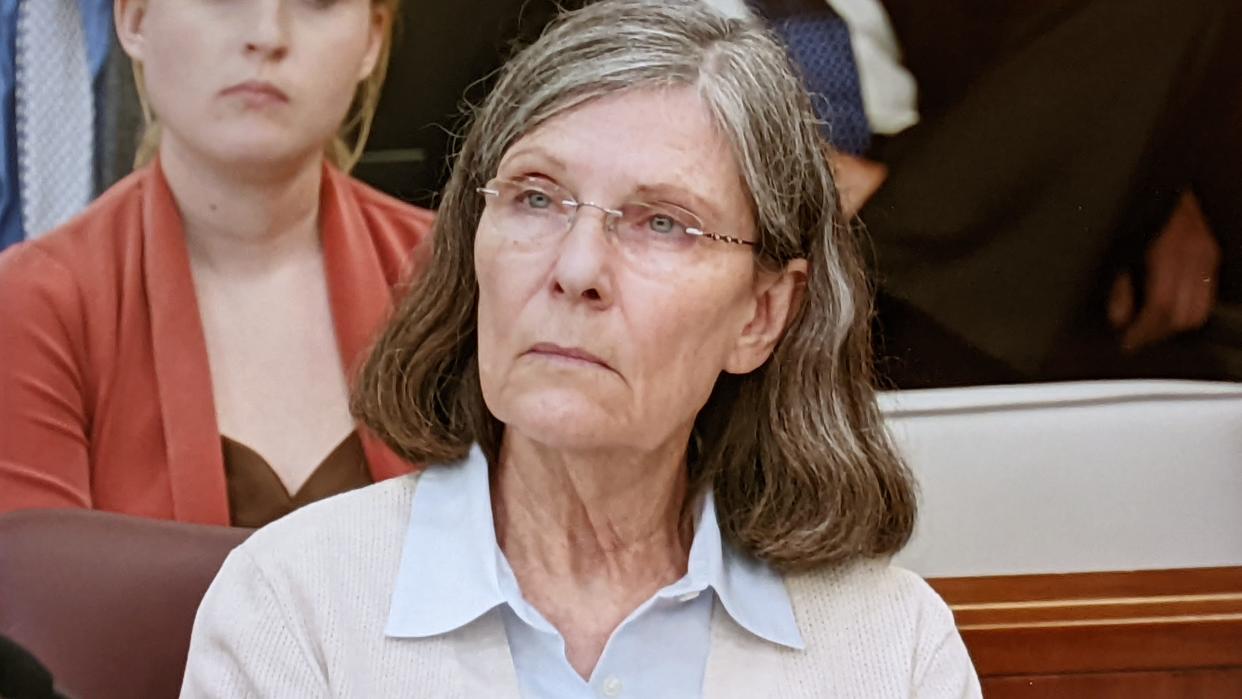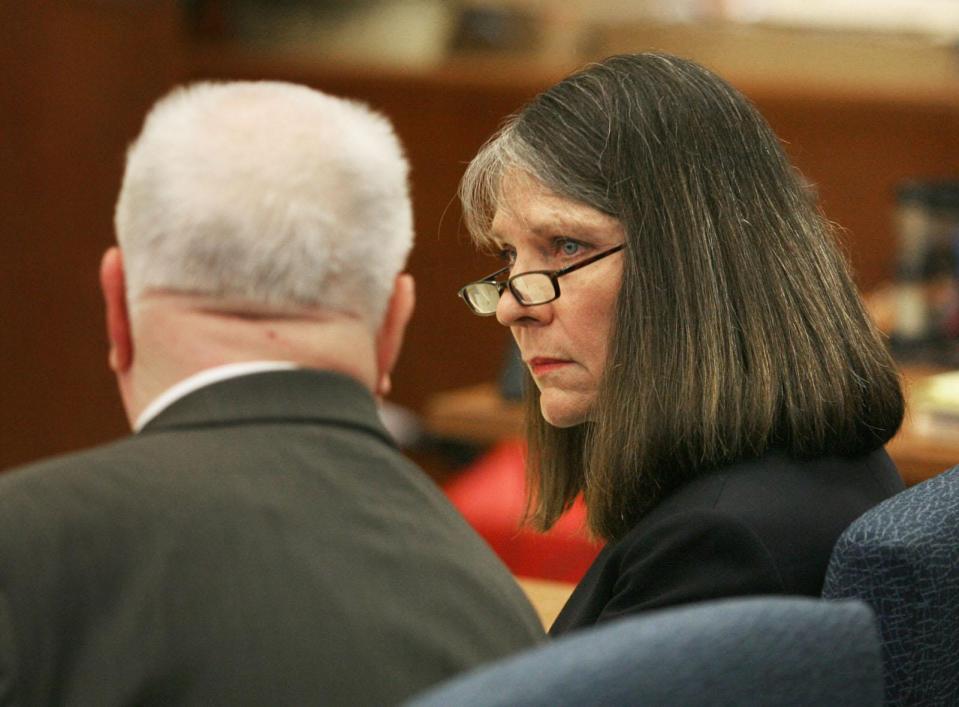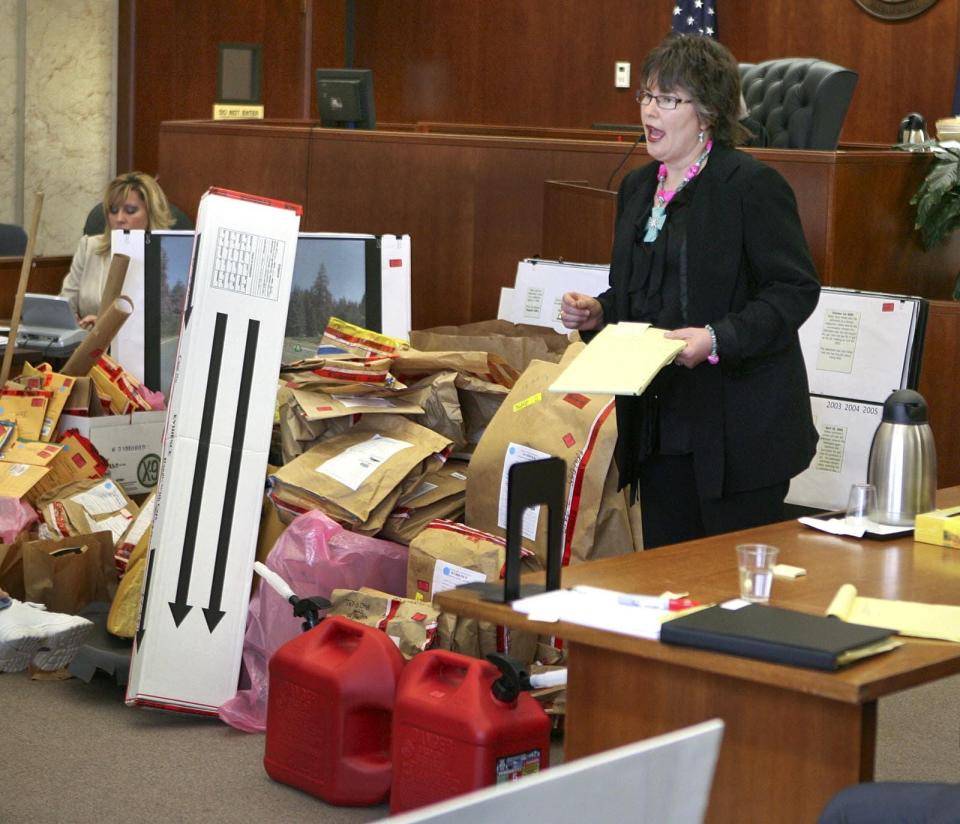With limited physical evidence, Dana Chandler gets a second day in court

- Oops!Something went wrong.Please try again later.
More than two decades after Mike Sisco and Karen Harkness were found shot to death in a Topeka duplex, Dana Chandler — the woman accused and once convicted of their murders — is again on trial for the killings.
After years of pre-trial hearings on motions to exclude evidence, change the trial’s venue and even dismiss the case altogether, jurors were finally seated Friday morning for the trial’s opening arguments later that day.
The defense had on Thursday made a final attempt to have Shawnee County District Court Judge Cheryl Rios either approve a change of venue or declare a mistrial.
Throughout the past few years leading up to the retrial, Chandler and her attorneys had argued that allowing the case to be heard in Shawnee County would be prejudicial to Chandler, since the case had become notorious locally and most jurors had at least heard of the case in the past decade.
National media covered Chandler’s original conviction on two homicide charges in 2012. The case continued to make headlines as it was appealed to the Kansas Supreme Court, which found that the prosecutorial misconduct had denied Chandler of her constitutional rights and overturned her conviction.
Rios denied Chandler’s last-minute motion to change venues, but the prosecution and defense agreed to read prospective jurors a statement describing the process by which Chandler’s conviction had been overturned and asking if they could remain fair and impartial.
Mike Sisco and Karen Harkness were found shot to death in July 2002
In his opening arguments, Shawnee County Deputy District Attorney Charles Kitt painted a timeline for the jury.
Dana Chandler had been married to Mike Sisco for several years, with two children between the couple, before their relationship took a rocky turn in the 1990s.
The couple underwent a four-year, acrimonious divorce process, with a court awarding Sisco full custody of the children and ordering Chandler to pay child support.
Sisco began dating Karen Harkness, but Chandler, he said, continued to obsess with her former husband, even after she had moved out of state.
Chandler broke into his home in spring 2002, during a time she knew her children would be out of the state.
Chandler also made frequent, persistent calls to both Sisco and Harkness, although the defense noted the custodial arrangement had permitted Chandler to call her children through Sisco once a day.
On July 6, 2002, Sisco and Harkness had gone to the Sac and Fox Casino, about an hour north of Topeka. Video surveillance showed they had gambled and ate dinner there without incident, and on the way back home at 1 a.m. the next day, they stopped for coffee at a gas station.
It was the last time they would be seen alive.
When Harkness’ parents and a couple of friends showed up at her home on July 7, 2002, they noticed the garage door was closed and Sisco’s SUV was parked in the driveway — unusual, especially since they had agreed to meet her daughter there for a fish fry that afternoon.
They went around the house and found that the sliding-glass back door was about four-inches ajar, and upon entering the home, Harold Worswick, Harkness’ father, began looking through the home to find the couple.
When he went down into the basement, he found both Harkness and Sisco naked and shot to death, their bodies cold to the touch. The pair had been shot 12 times, although police only found 11 shotgun shells on the scene.

No arrests made until Dana Chandler charged in 2011
Worswick, who has since died, testified in 2012 that he immediately called 911 while keeping the women in the group from seeing the dead bodies in the basement.
When police arrived, they found no evidence of a motive for the killings. Nothing appeared to have been taken from the home, and no signs of forced entry could point to a robbery gone wrong.
Additionally, the police found limited evidence to point to who had committed the shootings.
A single piece of hair on one of the shell casings and a piece of gum, found in a neighbor’s backyard, were the sole pieces of evidence with DNA evidence, although testing would find no matches.
Law enforcement, which included then-Topeka Police Department Lt. Richard Volle, then turned their attention to the couple’s personal circle of friends and family.
Questioning of Harkness’ former husband and adult children, and Sisco and Chandler’s two children showed that no one seemingly had any problems with the couple, except for Dana Chandler, who had been living in Denver, Colo., at that time.
Chandler, who had been called and informed of Sisco’s killing later on the day his body was discovered, appeared to show no remorse or interest in her children’s condition, Volle later testified, although a recording of that call only captured Volle’s side of the phone conversation.
When Chandler came to Topeka to attend Sisco and Harkness’ funerals, she also came in for questioning with the Topeka Police Department, bringing along credit card records of her purchases in the Denver area to prove she had not been in Kansas at the time of the killings.
Gaps in those records, though, as well as gaps in Chandler’s cell phone usage records and Chandler’s history of “obsessive” behavior with her husband, led investigators to suspect her of the killings.
But with limited physical evidence, the investigation went cold from 2004 until 2009, when the CBS crime show 48 Hours contacted newly-elected district attorney Chad Taylor for an episode on the case.
After re-examining the evidence, Taylor and his team of prosecutors decided they had enough to build a case.
In 2011, they worked with law enforcement in Oklahoma to arrest Chandler, who had moved to the state to live with her sister, for the murders of Sisco and Harkness.

The Kansas Supreme Court overturned Dana Chandler’s 2012 conviction, disbarred prosecutor Jaqcui Spradling
To lead the state’s case against Chandler, Taylor tapped assistant district attorney Jacqui Spradling. With limited circumstantial evidence, Spradling built her arguments on the limited circumstantial evidence that could tie Chandler to the crime.
A jury found Spradling’s arguments credible, and in 2012, District Judge Nancy Parrish sentenced Chandler to 100 years in prison, or one “Hard 50” sentence for each of the killings.
But on appeal, Chandler’s team pointed to various mistakes and false statements made by Spradling during the trial, and the Kansas Supreme Court determined Spradling’s win-at-all-costs approach to prosecution had deprived Chandler of a fair trial.
They reversed Chandler's conviction and set the stage for a disciplinary proceedings against Spradling in that trial and another case in Jackson County.
The Kansas Board for Discipline of Attorneys in June 2021 unanimously recommended Spradling be disbarred for her actions, and the state Supreme Court in May ruled to disbar her, citing an “intolerable pattern of deception.”
While the disciplinary proceedings against Spradling took place, however, Shawnee County prosecutors elected to try the case against Chandler while hoping to avoid Spradling’s same misconduct.
A judge set Chandler’s bail at $1 million, and she has since remained in custody since at the Shawnee County Jail.
Chandler has had various attorneys helping her, and she has for periods of time represented herself in pre-trial proceedings. However, Chandler is represented during the trial by a team of lawyers from Bath & Edmonds from Overland Park, led by Tom Bath.
Miracle of Innocence, an organization dedicated to freeing people who have been wrongfully incarcerated, is paying for Chandler’s defense. Co-founders Darryl Burton and Lamonte McIntyre were among a handful of people in court Friday to support Chandler.
Prosecution will focus on Chandler’s ‘obsession,’ defense will assert investigators had ‘tunnel vision’
Kitt, the Shawnee County Attorney chief of staff who is leading a team of three prosecutors in Chandler’s retrial, admitted to the jury that physical evidence cannot conclusively point to anyone, let alone Chandler.
But he emphasized that gaps and inconsistencies in Chandler’s prior testimony and interviews, when examined in combination with her troubled history and patterns of obsessive behavior with her ex-husband, are enough for the jury to find her guilty.
“Science is not going to solve this case,” he said. “This case is not based on DNA. It’s not based on hair, and it’s not based on fingerprints.
"This case is based on jealousy, rage and obsession, and at the end of this case and we’ve heard all this evidence, the state is going to ask you to find the defendant guilty of murder in the first degree times two, based on the evidence I discussed and all the evidence you’ll hear.”
In its opening arguments, the defense pointed out that nothing the state will present can place Chandler anywhere near Kansas, let alone Topeka — about 700 miles away from Chandler’s Denver residence at the time.
Bath, the lead defense attorney, said that investigators soon began to have “tunnel vision” after they started looking into Chandler’s history, ignoring any evidence that could have pointed to other suspects.
“You’re going to see a number of lost opportunities,” Bath said, pointing to investigators’ failure to properly swab bullet casings for DNA and fingerprints before ballistics analysis as one example.
He reminded the jury to keep in mind that witness testimony may be faulty, as people’s minds are not like machines and cannot be simply rewound.
Additionally, much evidence or reports from auxiliary investigations — even some which should have been maintained in police depositories — has been lost or can no longer be retrieved.
“There is no evidence that places Dana in that duplex,” Bath said. “They’re going to ask you, because they believe her conduct is not normal, that she has to be the killer.
I suggest that this is a textbook case of why we have presumption of innocence. The burden is on the government, and the burden is beyond a reasonable doubt. To close it all, we’re going to ask you to find Dana Chandler not guilty.”
The trial will pick back up with additional witness testimony Monday morning and is expected to last three to four weeks.
Rafael Garcia is an education reporter for the Topeka Capital-Journal. He can be reached at rgarcia@cjonline.com or by phone at 785-289-5325. Follow him on Twitter at @byRafaelGarcia.
This article originally appeared on Topeka Capital-Journal: Dana Chandler on trial again for Mike Sisco, Karen Harkness killings

